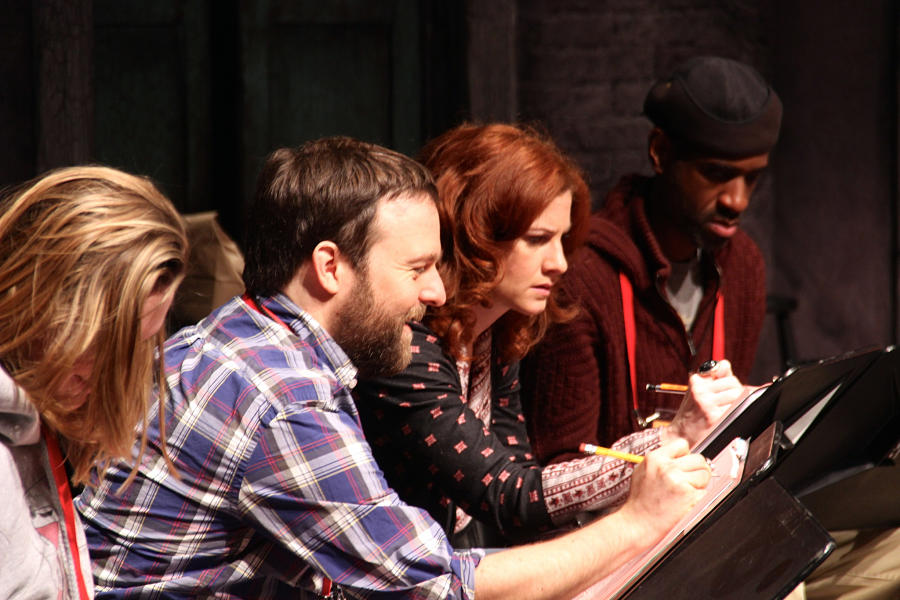DENVER: Many writers will tell you that their real writing is done in the rewriting. By that measure, the Colorado New Play Summit got some some real writing done this year. As in the past, the summit gathered four featured playwrights, gave them a week of rehearsal time with creative teams from the Denver Center for the Performing Arts and around the country, then presented a weekend of public readings. But this year the summit went further: After that first showing, the playwrights went back to work for another week of revisions and rehearsals, then presented a second weekend of readings for industry professionals.
The hope, of course, is that this extra development time will significantly shorten each play’s road toward its ultimate stage-readiness.
“I think adding a second week is sort of electrifying and extremely original,” said Theresa Rebeck, whose The Nest was one of four featured readings at the summit, and one of three DCPA commissions. “Nobody else does that. That leaves a luxurious amount of time to really think about what your next step wants to be.” She added, “I feel like the Denver Center is always trying to figure out the smarter and better thing to do for playwrights.”
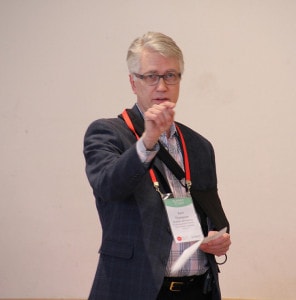
While the institutional focus at the summit is always squarely on development, Robert Schenkkan admitted that every playwright is keenly aware of the statistics DCPA producing artistic director Kent Thompson has amassed since founding the summit in 2006: To date, 57 percent of all plays selected for summit readings have then been staged as part of the DCPA Theatre Company’s mainstage season. Thompson has now presented 25 world premieres in 10 years. He not only believes his legacy in Denver will one day be judged by those numbers—he wants it to be.
“We are committed to taking at least half of what we do at the summit and putting it on the stage—and sometimes more,” Thompson said. “We don’t make any promises, but if you look at the numbers, one leads to the other. This is what we do.”
That changes the way the writer approaches the work, said Schenkkan, author of the Tony-winning play All the Way, and one of 36 playwrights to have been commissioned by Thompson. Schenkkan attended the 2015 Summit not as a featured playwright but rather as the writer, with Neil Berg, of The 12, a new rock musical scheduled to open March 27 at DCPA that imagines what might have happened to the apostles during the three days after Jesus’ death.
“For the writer, there is a huge psychological advantage when you know there is an end game,” Schenkkan said. “With that kind of support and commitment, it just opens you up. You can relax and dig a little deeper and dare a little further. I think the notion that a production is a very real possibility at the end of all this suddenly makes the stakes seem very real.”
Catherine Trieschmann, whose church comedy Holy Laughter was a featured summit offering, said that “even though you don’t know if your play is going to be picked up for production, it almost gives you the mindset that it will be. It gives you the sense that your play will have a continued life. And I think that adds an urgency to the work that may not be there otherwise.”
Jason Gray Platt, whose ’s The There There was another feature play, said that Thompson’s numbers “make me feel much more optimistic than I probably should, especially when you think of how many pieces from Denver have gone on to New York and had much bigger lives,” ticking off the titles The Most Deserving (Trieschmann), The Legend of Georgia McBride (Matthew Lopez) and The Whale (Samuel D. Hunter).
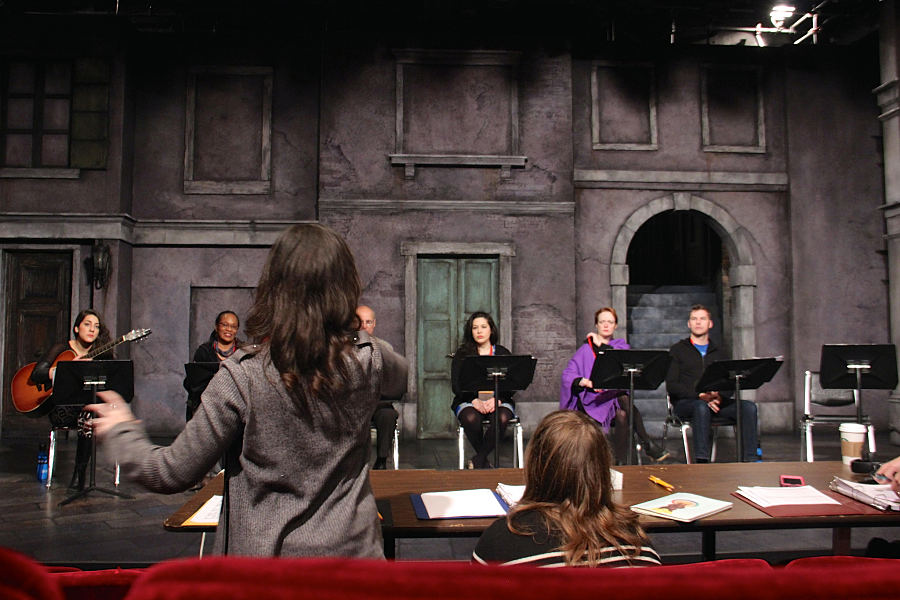
One of the hottest topics at the 2015 summit, onstage and off-, was gender parity. The Denver Center launched the Women’s Voices Fund in 2005 to support female playwrights and directors, and it recently surpassed $1 million in donations. But it’s clear to Rebeck there is much work to be done to achieve national gender parity onstage. While she credits Thompson for “walking the walk” in programming women writers, she said, “The rest of the American theatre is still catching up; things have not gotten better elsewhere.”
The four featured plays at the 2015 Summit—which, it should be noted, went well beyond parity to a ratio of three women to one man—had often overlapping things to say about gender dynamics, ethnic identity, memory and community.
Rebeck’s biting comedy The Nest (which twice changed titles during the rehearsal period from The Crow’s Nest, then The Crown, and finally The Nest) has barbarous fun with the vastly different ways men and women see the world. It’s set in a bar, where Rebeck explores the notion that no one remembers the same story twice, especially when alcohol is involved. Here the differences in recall make plain the vastly different ways men and women see the world in the first place.
Platt’s The There There blatantly tests our perhaps latent prejudices when it comes to gender and sexuality by presenting the story of one couple over 60 years. The same script was read by two men the first weekend of the summit—and by a man and a woman the second. The characters are identified only as M and K.
“Most of my work is gender-neutral, because I hope gender soon becomes akin to what race is now,” said Platt. “In Shakespeare, no one cares if Hamlet is black or Juliet is Latino. So if you are not creating a piece that is specifically about gender or sexuality, then it should be free, I think, for anyone to play it.”
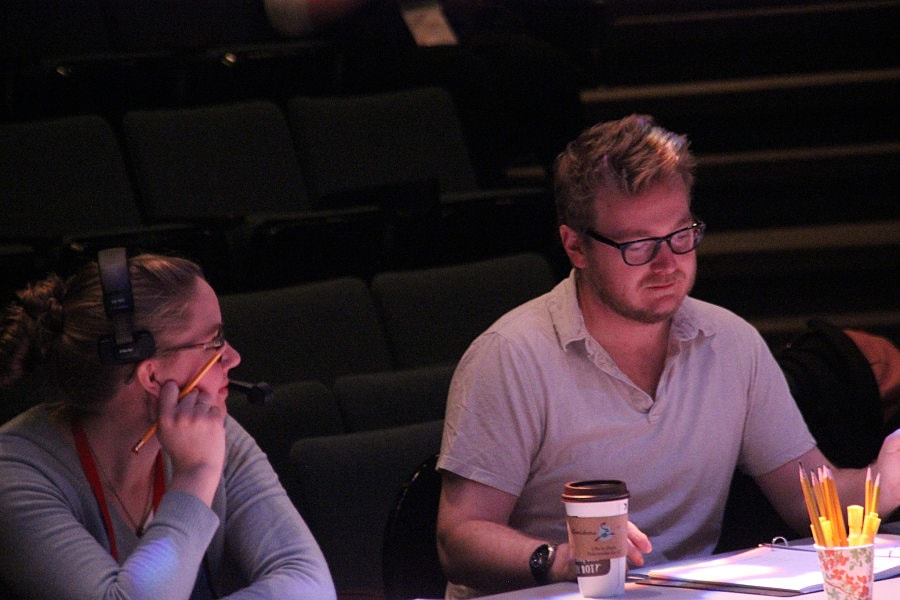
The There There is a thoughtful piece about emotional and erotic love—especially the kind, as Platt puts it, that never leaves the bloodstream. With the growing incursion of social media, Platt imagines a futuristic romantic dystopia that allows one couple to continue to weave in and out of each other’s lives long after physically parting ways. “The play is really about how technology informs the loss of loved ones,” Platt said, “and how our increasing connection with one another is actually complicating our ability to fully grieve for people.”
His dream staging, he said, would include multiple actors of varying races and genders playing the two characters in multiple iterations. If an audience finds one actor pairing comfortable and another troublesome, then all the better.
Rebeck’s The Nest and Trieschmann’s Holy Laughter could be considered companion comedies, in that they both focus on dwindling communities. In The Nest, it’s a disparate group of tavern regulars who might otherwise be strangers. “The bar is on its last legs, but it has very beautiful bones inside it,” said Rebeck, and that makes it attractive to a potential buyer. “No one is really coming to this bar anymore, so it’s really about the architecture of our communities, and how they are being razed in favor of a much more impersonal corporate reality.”
Meanwhile, the declining community in Trieschmann’s Holy Laughter are the dwindling parishioners of small, struggling Episcopalian church in the Colorado foothills. She introduces a wholly original and human character for the stage in Abigail, an unorthodox and flawed priest who struggles to keep the church—and the minds of her eccentric parishioners—open. Trieschmann’s hope is that audiences both laugh and are challenged by the issues she raises.
“People often say that every playwright addresses the same question in every single one of their plays,” said Trieschmann, who has spent her entire life worshipping in different Protestant denominations. “My question is probably, ‘Does God exist, and what does that mean for us?’ ”
Finally, Tanya Saracho’s FADE is a semi-autobiographical play about an inexperienced Latina hired to write for a TV detective show. She develops a friendship with a Latino janitor who works at the same TV studio, but things get both morally and culturally complicated when she borrows from his life story. FADE openly addresses class, gender and race, both from within the Mexican community and the larger United States, in often surprising ways. Saracho freely admits her protagonist has no business getting hired in the first place. After all, it is her own story.
“Listen, I only got into television because I was a diversity hire,” Saracho said of writing for Devious Maids (she has since gone on to write for Looking, among other shows). “But I don’t care why I got in there. I just needed an in, because we need to be in there.”
In the play, by the time the writer Lucia realizes that she, too, was a diversity hire, Saracho said, “She also realizes, ‘Oh God, now I am part of this. I am part of the problem that I came here to solve.’ ”
It’s a problem that’s hardly unique to television.
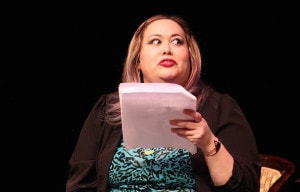
“I know the reason I got my first few playwriting commissions is because I am Latina playwright,” Saracho said. “But you know what? I don’t care. That’s not how I stayed in. I can’t feel bad about that. Because if you look at the (theatre) seasons that just got released around the country? We are not in there that much.”
In addition to attendance at two world premiere plays—Eric Schmiedl’s Benediction and James Still’s Appoggiatura—the expanded summit also offered many new activities, including playwriting “boot camps” led by Matthew Lopez and Paula Vogel.
For their part, the featured playwrights reacted to their expanded playtime with something like stunned euphoria.
“I don’t know how to describe the essence of this place,” Saracho said. “ ‘Nurturing’ is not enough. Everyone here is just trying to get your play born, so it’s like everyone is your midwife.”
Memorable lines from the featured plays:
“Listen, I’m not going to go get into the whole Latino vs. Hispanic thing with you because if all those think tanks haven’t figured out which term we should be using, there’s no way you and I are figuring it out.”
—FADE by Tanya Saracho
“What I don’t like is that men go to war and murder women and children and then act like, ‘Oh, sorry. Couldn’t help that. That’s just who we are.’ ”
—The Nest by Theresa Rebeck
“Lord, please comfort and encourage Lloyd as he cares for Evelyn. Alzheimer’s is such a beast. And give me patience, deep wells of patience, as I deal with him. Canyons of patience. Transform my heart into a Grand Canyon of patience when dealing with that sexist, small-minded, jack in the ass. Sorry. I am a pebble on the beach. I am still water.”
—Holy Laughter by Catherine Trieschmann
“We close the door, and then there’s nothing else in the world. There’s only us, there’s our bed, there’s the sheets, no sounds but our breathing, only our fingertips for light. While we open those wounds again. The pain from it tastes extraordinary.”
—The There There by Jason Gray Platt
John Moore was the theatre critic at The Denver Post for 12 years before taking a new position as the DCPA’s senior arts journalist, where he continues to cover the entire Colorado theatre community for a new media outlet at www.MyDenverCenter.Org.

